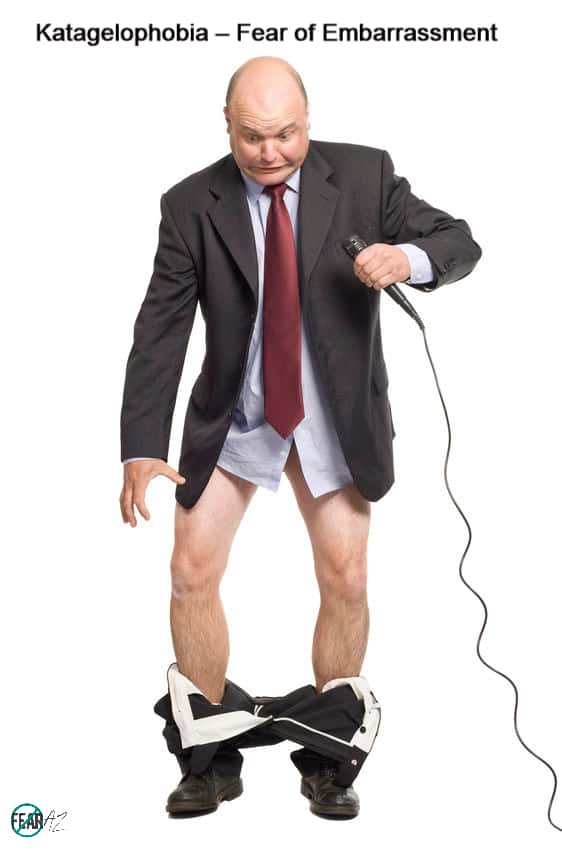Share This Article
Katagelophobia: An Embarrassing Issue?
Do any of the following scenarios cause you excessive fear?
- Sneezing in public, and a huge mess makes its way out of your nose?
- An unexpected, noisy release of flatulence?
- A huge, red zit smack dab on the end of your nose, shining for all to see?
- Someone opening the bathroom door while you’re sitting on the throne?
- Clogging the toilet at your date’s apartment?
Have you ever been in a situation where you worried you would be rejected in a job interview or by a person you admire—or worse yet, an old flame?
The list of embarrassing moments is endless and can easily fit into most peoples lives.
We’ve all been mortified with embarrassment. We’ve all been laughed at, and we’ve all had moments when we wished we could crawl into a hole and close the lid. Most of us deal with these little bumps in the road by laughing along with the crowd or pushing the memories into the back of our minds.
Some of us, however, are scarred for life by these common, meaningless events. There are those, possibly even you, who live in complete fear—near terror—at the thought of falling victim to another embarrassing moment.
Imagine not being able to confront basic social situations without bone-chilling anxiety.
If you happen to fit this profile, then you may have an excessive fear of embarrassment. Yes, you may have a phobia that is inhibiting you from achieving your goals of living a normal, fulfilling life.
Let’s dig deeper into this phobia. After all, the key to controlling it, is understanding it.

What Is the Fear of Embarrassment Called?
The fear of embarrassment is called katagelophobia, and it’s more common than people realize. Sometimes, this nagging fear of being embarrassed or ashamed may even prevent people from visiting their health care professionals, going to church, or going out on a date.
Having a strong fear of embarrassment can cost you a great deal in life, especially if you are otherwise a competent person and deserving of opportunities. If you ever reach a point where you have difficulty facing situations that put you at risk of embarrassment, it might be time to address the problem.
Embarrassment and failures are the salt of life. They may cause grief, but it’s something everyone must eventually overcome to succeed in our careers and live healthier, fulfilling lives. The first step to solving a problem of this magnitude is to acknowledge it and then to better understand its triggers and roots.
Unpacking the Fear of Embarrassment
It’s time to put the fear of embarrassment under the microscope and examine its features.
Embarrassment is a phenomenon we all experience, but some of us are more sensitive to it than others. Embarrassment and some of its friends—shame, humiliation, and the like—are not necessarily a bad thing. If anything, when they exist in appropriate moderation, they’re actually useful tools in guiding us to become better people.
Human beings are social creatures, and we’re wired to judge each other. But when this fear reaches an extreme point, it is far more harmful than beneficial. Having or experiencing such a fear can be quite destructive.
If you are trying to assess yourself or learn more about katagelophobia in order to relate to others more comfortably, here are some interesting notes:
- People who fear being ridiculed tend to avoid revisiting those individuals or even inanimate objects associated with past experiences of being ridiculed or degraded.
- People with a fear of getting embarrassed are more self-conscious than others and look uncomfortable or nervous all the time. This fear has a tendency to manifest as social anxiety, likely because they are closely linked.
- People who fear embarrassment struggle to make meaningful, long-lasting connections with others. This deprives them of intimacy and makes them feel hopeless and disconnected all the time.
- People who fear embarrassment are reluctant to chase opportunities at work or in college and bolster their careers.
What Causes Katagelophobia?
Like most phobias, katagelophobia is usually rooted in traumatic experiences during your most impressionable years. These traumatic experiences include bullying, mockery, and ridicule—all denigrating experiences many of us have likely shared but at varying degrees.
Like we said earlier, not all of us experience embarrassment in the same way, because our sensitivities differ. Some people can laugh off an embarrassing experience, learn from their mistakes, and resume life with the same level of confidence.
But for others, such experiences might be interpreted more heavily. This is especially true if you are a habitual overthinker. For such people, the experience of bullying or humiliation doesn’t end with that day but continues to live on in their head, stigmatizing them and making them extra self-conscious.
Such debilitating fear is a pathway to catastrophe, because you are only human and you are going to make more mistakes. If you can’t deal with the unpleasantness of even a little judgment, your life and world will become smaller and revolve around this anxiety.

Katagelophobia Symptoms
Phobias need to be taken seriously. Left unchecked, they tend to grow and get worse over time, stopping you from achieving a higher quality of life. Phobias are also well-known pathways to anxiety and depression.
Knowing what the symptoms are and finding the right time or way to intervene is the key to overcoming the fear of embarrassment.
Physical Symptoms
Due to the strong link with anxiety, the physical symptoms of katagelophobia are more or less the same:
- Sweating, trembling with hot flashes or chills
- The sensation that there are butterflies in your belly
- Tightness in the chest
- Need to go to the restroom often
- Confusion or disorientation
- Nausea
- Feeling faint
- A rise in blood pressure
Psychological Symptoms
In extreme cases, it’s possible for a person with katagelophobia to experience a panic attack, especially if they’re overwhelmed. The fear of embarrassment is complex and usually nests in deeper fears and psychological troubles, such as:
- Fear of loss of self-control/composure
- Feeling shame, guilt, humiliation, low self-esteem
- Feeling disconnected from others and constantly withdrawing into yourself
- Depression, hopelessness, dread
- Confusion and mood swings
- Social anxiety
- Strong intimacy issues
- Frustration
Self-Help with Katagelophobia
One way or another, if you are dealing with this, you will have to find a way to overcome it. It is not that easy of course, we know.
Since trauma is often the root of origin for most phobias, learning how to come to terms with your traumatic experience is arguably the most effective way to address your problems. It may require having to relive it for an uncomfortably long period of time and viewing it from different perspectives.
Some psychologists suggest trying out this mental exercise where you stop seeing yourself as the protagonist in your worst phobia and see yourself as an observer instead. Basically, you can be your own shrink, but you’ll do an even better job, because you are the one who has lived your experiences.
That said, please do not take any medications without consulting a doctor or licensed psychiatrist first. If your case requires medication, seek professional help to learn your dosage requirements.
Seeking Professional Help with Katagelophobia
Many reputable psychologists claim that embarrassment is not a basic emotion, but that it springs from a combination of simple emotions that combine to form a complex one. In other words, your fear of embarrassment is interwoven with either social anxiety, loss of dignity, low self-esteem, and possibly even more conditions.
This is why it’s such a difficult ordeal to overcome your fears and also why there is no shame in seeking professional help; none whatsoever. It’s always better to ask for help from someone trained to help you alter your inner mechanisms.
The most common form of treatment psychologists administer is simply talking your way through it. They help you identify your own patterns, things you’re currently doing that are unhelpful, and understanding your complicated feelings better.
Coping with Katagelophobia
Not all phobias can be cured, but they can certainly be managed with some effort. The one thing that always helps is knowing more about your condition, seeking others that might be experiencing the same thing, and finding strength in solidarity.
Another important thing: Never underestimate the multitude of psychological benefits that eating healthy and staying fit and active can bring. Sometimes, a bad diet is the only thing actually keeping you down.
In Conclusion
It’s okay to stutter during a presentation. It’s completely fine if you accidentally left your zipper open after a trip to the loo. It’s not the end of the world if you were rejected from a job interview. Most of the time, they’re not rejecting you because you are incompetent but rather because you don’t meet a specific requirement of theirs.
Learning you’re not special and that everyone deals with embarrassment at all levels may seem like a harsh lesson, but—if anything—it’s full of joy. It will free your mind from its self-imposed constrictions and help you grow and understand others better.
Never be ashamed to seek help. Help exists because there are millions just like you.




